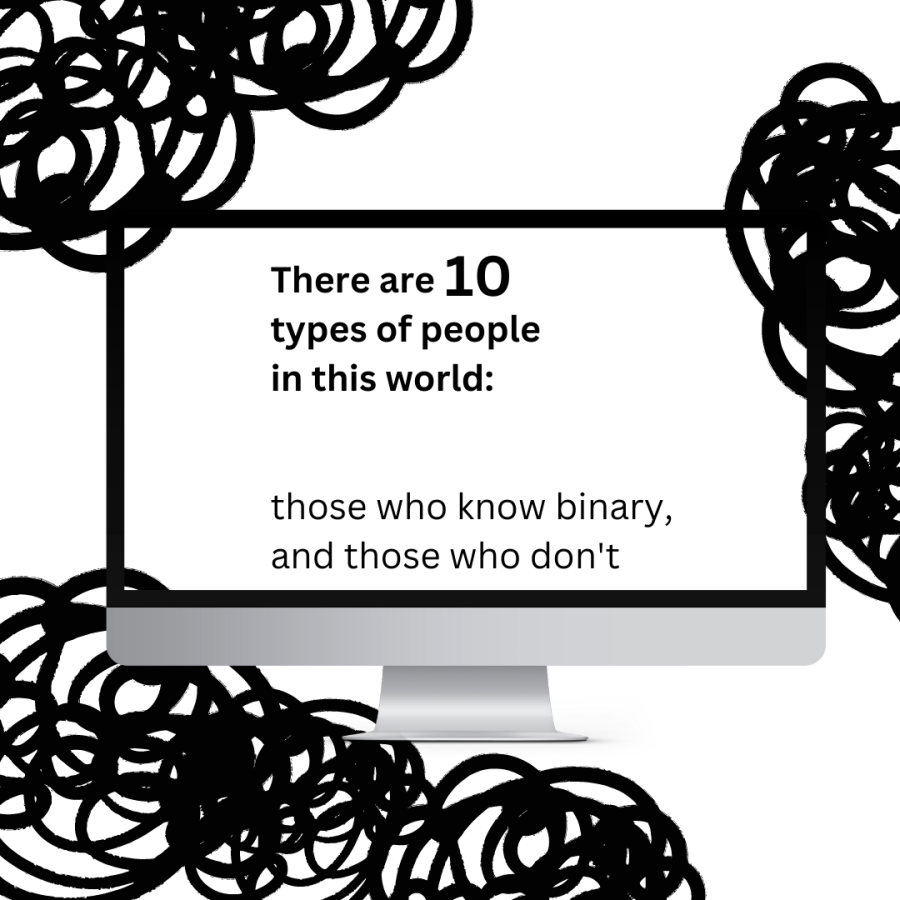Programmed to Celebrate
This is a classic Computer Science joke about 10 people: those who know binary, and those who don’t. (10 means “two” in binary, not “ten”.) Come to Room 97 Dec 5-9 during lunch for some fun CS activities!
From December 5th-9th 2022, we celebrate CS Education Week.
Proponents and participants of CS Education Week believe that everyone should be educated in what’s becoming increasingly fundamental to our world’s ability to function. Computer Science (CS) is everywhere – it runs our apps, websites, calculators, dishwashers, and more! An anonymous student also notes that CS runs “Pokémon games”.
Anything non-living that makes decisions based on sensor inputs likely uses CS of some sort. In most cases, CS takes an input and produces an output by doing some “black box” stuff in between, which include (but are not limited to) conditional statements and loops. The “black box” means that the logic is hidden from the user, so the user doesn’t need to know CS.
Knowing a bit of how CS works can go a long way, but does an hour crash-course of CS over one week in a year really help?
Sophomore Lily Vu says that “it’s helpful when it comes to introducing new learners to CS,” and for already experienced students, it’s a “quick review” to programming/coding. The recommended introductory Hour of Code starts in no particular programming language, rather using pseudocode. Pseudocode literally means “fake code”, and it focuses on the logic of programming rather than the technicalities by using blocks or commands.
A few students recall doing coding activities in school when they were younger. Junior Taylie Smith remembers, “it’s a great introduction for those who are interested, or to show how fun coding can be.” Coding websites “make it really simple to start making code so it wouldn’t be a waste even for” short periods of time.
However, such a short exposure may not be extremely helpful to all people. Senior Anthea Goh says, “I don’t think that everyone would benefit from this, but I think it would be worthwhile for younger kids/students to introduce them to the subject.” This exposure to CS is invaluable to younger generations, who’ve grown up with CS and will undoubtedly see it grow in their lifetime. Knowing a little bit about CS would “have a positive impact on society as a whole,” says Anthea.
Lily says that compared to pseudocod-based lessons, “typing out code in a programming language… would be much more beneficial if you want to get more serious about learning code.” However, Hour of Code is a good introduction, and one step up from that would be using MIT App Inventor.
On the other hand, Taylie says she can “definitely see some students in our community experiencing” a short introductory lesson to coding “as a waste of time because they don’t have any interest in that subject.” But, remember that you only know what you like if you try it out!
No matter your interests, CS will almost always be present and applicable. Drop by Room 97 (Computer Science and Robotics) during lunch next week to learn a bit of coding. By planning to set aside a few minutes next week to test your knack for coding, you may discover a fun new hobby or career interest!











